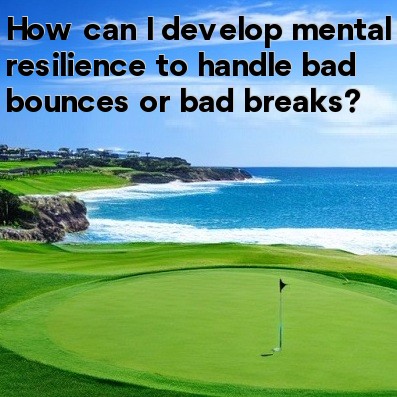
How to Develop Mental Resilience in Golf
Golf is a game of ups and downs, filled with both good bounces and bad breaks. While technical skills and physical abilities play a significant role in one's performance on the course, mental resilience is equally important when it comes to handling unexpected challenges. Here are some strategies to help you develop mental resilience in order to handle bad bounces or bad breaks:
- Focus on What You Can Control: One of the first things you should do when faced with a bad bounce or bad break is to shift your focus to what you can control. Accept the situation and direct your energy towards making the best shot possible from where you are. Dwelling on the unfairness of the situation will only distract you and negatively impact your game.
- Develop a Positive Mindset: Maintaining a positive mindset is crucial when facing adversity on the golf course. Remind yourself that bad breaks happen to everyone and that it is a part of the game. Approach each shot with a positive attitude, believing in your abilities to overcome any challenges that come your way.
- Practice Visualization Techniques: Visualization can be a powerful tool in building mental resilience. Before each round, spend some time visualizing yourself successfully handling bad bounces or bad breaks. Picture yourself adapting to the situation, making necessary adjustments, and executing the shot with confidence. By visualizing positive outcomes, you can mentally prepare yourself to handle any obstacles that may arise.
- Develop a Pre-Shot Routine: Establishing a consistent pre-shot routine can help you stay focused and composed, even in the face of bad luck. A routine helps create a sense of familiarity and comfort, allowing you to stay in the present moment and execute each shot without letting external factors affect your concentration.
- Practice Patience: Golf is a game that requires patience. Understand that bad breaks are a natural part of the game and that they do not define your overall performance. Embrace the challenges as opportunities to grow and learn. Stay patient, remain resilient, and trust that good breaks will come your way soon enough.
- Learn from the Experience: Every bad bounce or bad break is a chance to learn and improve. Instead of dwelling on the negative aspects, analyze the situation objectively. Identify what went wrong, determine what you could have done differently, and use that knowledge to make better decisions in the future. By approaching each experience as a chance to learn, you can turn adversity into growth.
Developing mental resilience in golf takes time and practice. It is a skill that requires consistent effort and a willingness to face challenges head-on. By focusing on what you can control, maintaining a positive mindset, utilizing visualization techniques, establishing a pre-shot routine, practicing patience, and learning from each experience, you can strengthen your mental game and effectively handle bad bounces or bad breaks on the golf course.





